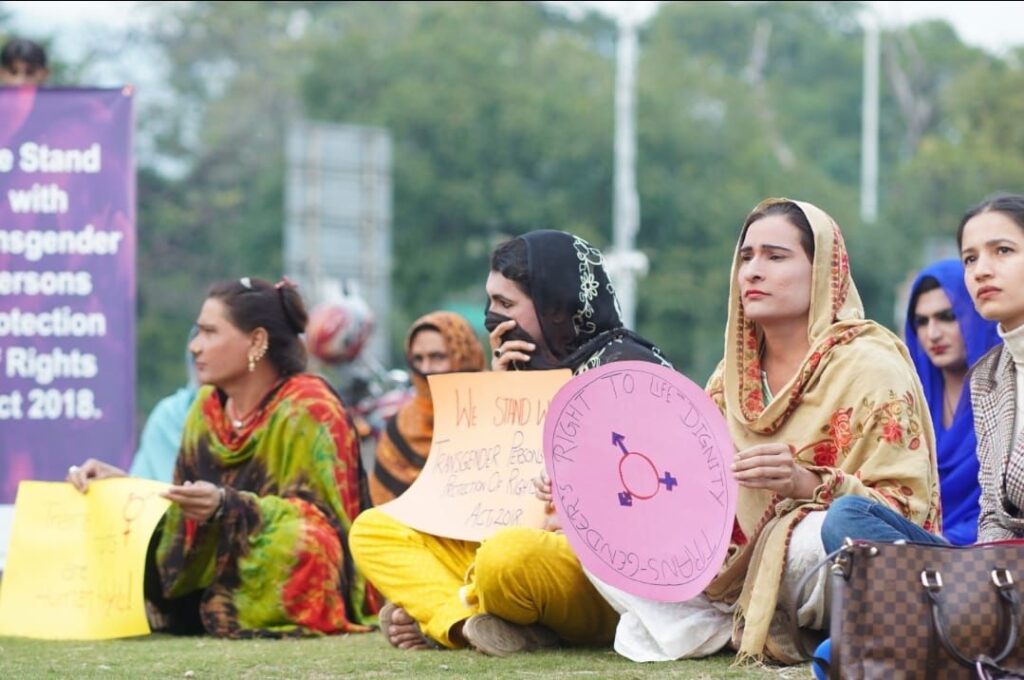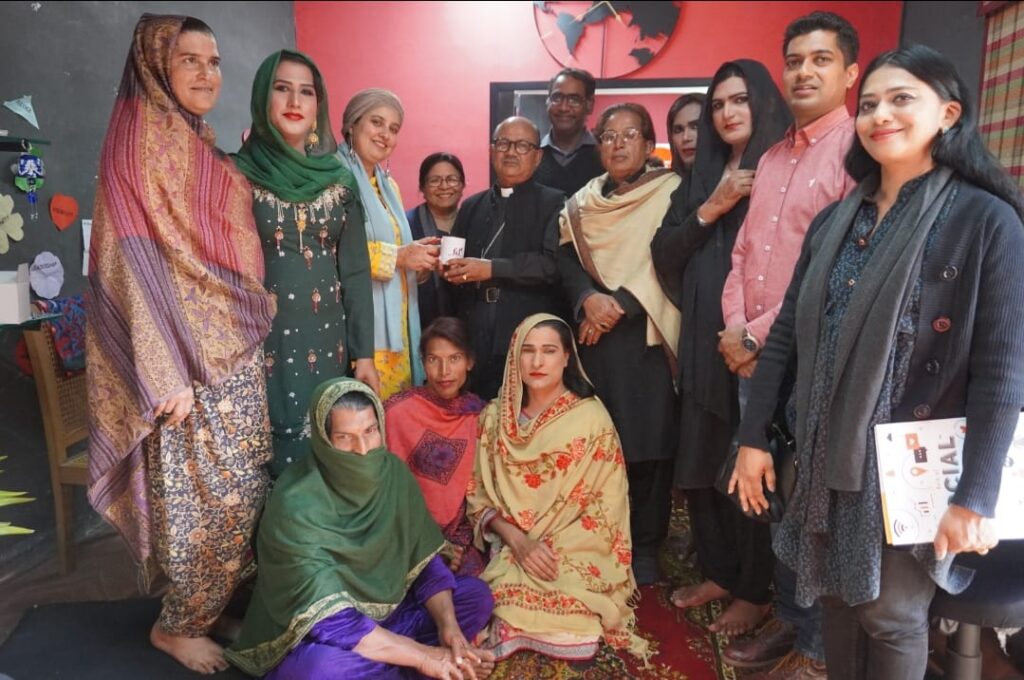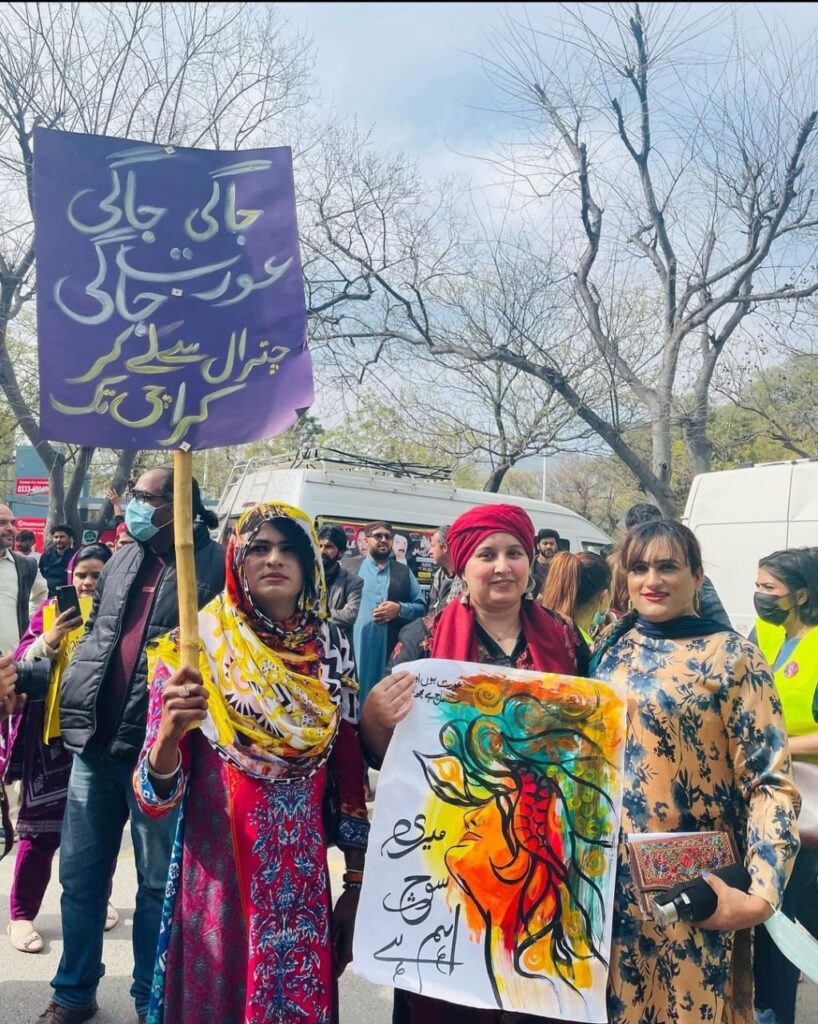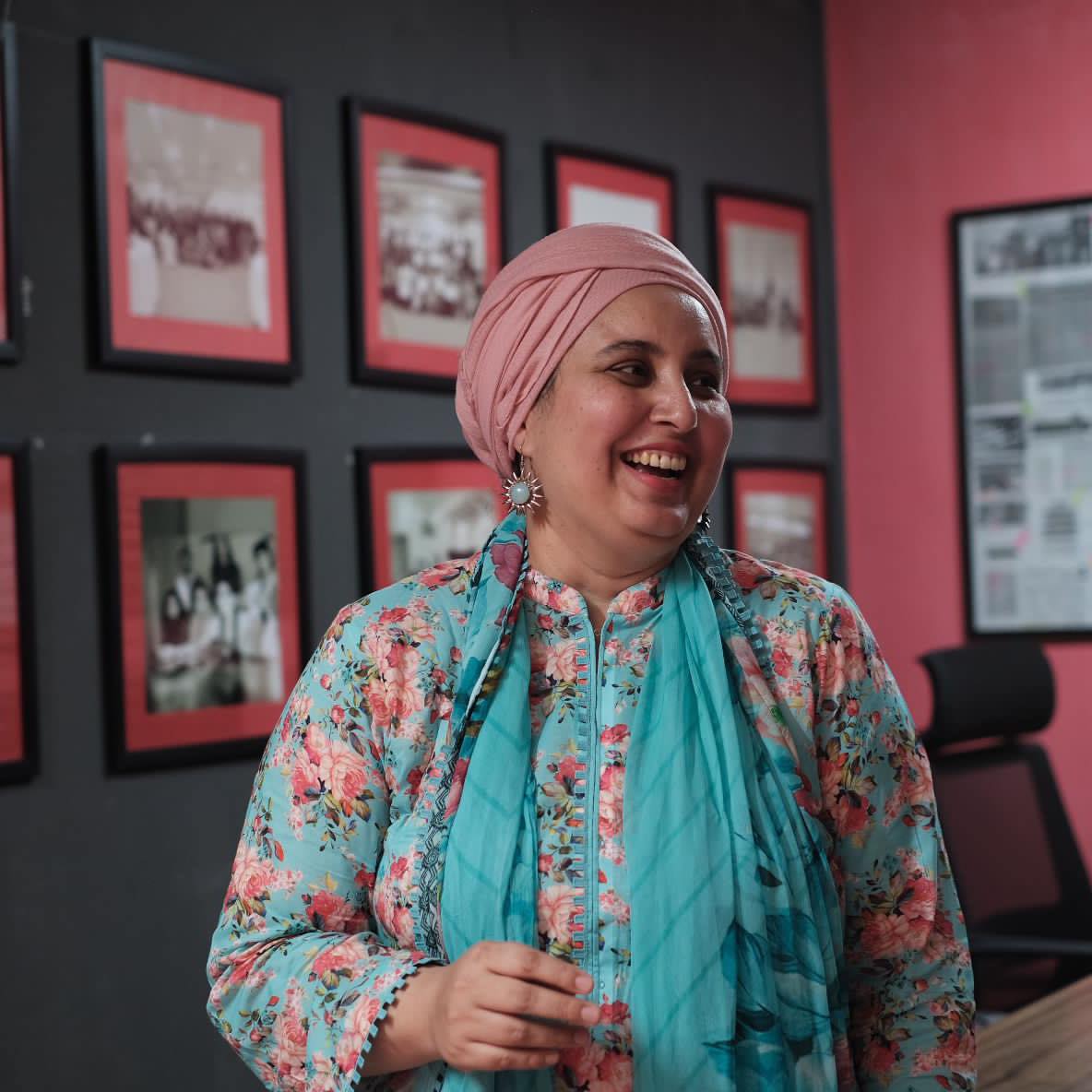Recognition to regression: protecting transgender rights ended in striking down self-perceived gender identity and its expression in Pakistan
Pakistani human rights activist Uzma Yakoob provides an overview in Feministeerium’s world series about the biggest victories and losses of the Pakistani trans community over the past decade.
The transgender community in Pakistan, known as Khwaja Sira, has been present in the subcontinent of South Asia for many centuries. It can be traced back to the Mughal Empire and British colonial rule in the region. The term transgender is relatively new in Pakistan; one can say safely that it was mainly introduced from 2010 onwards. Terms like Khwaja Sira and eunuch remained more popular in the local context. The trans community has been an integral part of Pakistani society, and especially transgender women have always been noticeable. Regardless of that, they have remained marginalized. Rejection or abandonment starts in biological families and ends with social rejection on a daily basis from politics, the economy, education, health, and cultural life.
Transgender people (mainly transgender women) were always visible, begging at the traffic lights, bus or railway stations, outside shrines, or performing at wedding ceremonies, birthdays, baby showers, or bachelor parties as dancers. Transgender women were always considered to be dervish, pious beings who never indulged in sexual activity1, or fakeers, people who have a special connection to God and who visit important social events to give blessings and prayers for prosperity. In reality, Pakistani transgender women have always been involved in sex work. Transgender men, on the other hand, had virtually no visibility until recently.
Pakistan’s transgender rights movement achieved a landmark in 2009 when the Chief Justice of Pakistan passed a ruling to recognize transgender persons’ citizenship rights.
The other side of the visibility is extreme violence, ranging from physical to sexual, economic, and psychological. They are ostracized from social and cultural life, they are not allowed to live with other people in the same neighbourhoods or even settlements but are directed to slums or made to pay higher rents compared to others. They are bullied in public, on public transportation, in schools, hospitals, and public offices. They are not allowed at family events or parties, sometimes even at the funerals of relatives. They have faced condemnation and hatred simply because of who they are and how they have chosen to express their gender. This multilayered exclusion has caused transgender people poor health and hygiene conditions, loneliness, marginalization, and depression, forcing them to abuse drugs. They also tend to suffer more from sexually transmitted diseases (STDs).
We achieved recognition
Pakistan’s transgender rights movement achieved a landmark in 2009 when the Chief Justice of Pakistan passed a ruling to recognize transgender persons’ citizenship rights and direct the National Database and Registration Authority (NADRA) to not only issue citizenship cards to transgender people but also recognize their right to vote. This recognition encouraged transgender people to sign up with NADRA and get their registration cards with dignity.
Since 2009, a series of major events in the transgender rights movement have followed in Pakistan. Some groups of transgender people and rights activists have come together to demand legal protection to ensure guarantees for the rights of transgender people. There were debates about having legislation in place that would protect transgender rights, and a couple of legislative bills were drafted in collaboration with the social welfare department at the federal level. The initial bill was drafted with a charity lens and not with a rights-based approach, and the terms that were used were eunuch and shemale, indicating a medical or psychological disorder.

Pakistani trans community in defence of their rights. Photo: FDI.
In 2016, a significant milestone was reached. Transgender individuals had repeatedly been denied the right to file complaints about gang rape. For instance, a severely injured person with multiple bullets in their body was not admitted to a hospital simply because the administration was unsure whether to place them in a male or female ward. As a result, she lost her life.
The highlight of the “Transgender Persons Protection of Rights Act 2018” was the right to “self-perceived gender identity and expression”.
In response, trans rights activists and civil society organized protests throughout the country. Due to significant media attention on the concerns and demonstrations of the transgender community, both the Pakistani national parliament and its provincial parliaments decided to adopt laws protecting transgender individuals.
On March 7, 2018, the Pakistani parliament approved the historic “Transgender Persons Protection of Rights Act 2018”. It was a significant step towards creating an inclusive and safe Pakistan for transgender and intersex individuals. The Act was very comprehensive, right-based, and protected the fundamental human rights of transgender and intersex persons, covering everything from the right to education, health, employment, voting, holding public office, inheritance, assembly, etc. However, the highlight of the Act was the right to “self-perceived gender identity and expression”.
The only fundamental right that was not included or recognized by the Act was the “right to marriage or to start a family”. The legislative process was long and complex, trying to ensure all key stakeholders’ input and that everything aligned with Islamic values, aiming for approval by the Council of Islamic Ideology (CII). Unfortunately, homosexuality is still criminalized in Pakistan under Penal Code Section 377, inherited from colonial British law. Therefore, no law or legislation can support or protect the rights of people with diverse sexual orientations. Pakistan received huge applause all over the world for passing such a progressive Act protecting transgender and intersex people.

Meeting with Bishop Samuel Azariah from the Pakistan Christian Study Center, discussing an inclusive church life for the transgender community. Photo: FDI.
The Act was passed in March 2018, and it came into force in May 2018. Just a few months after the passage of the Act, Pakistan held its general elections in July 2018. At least 2,000 transgender people were registered voters at that time, and five transgender people contested for general seats from different constituencies across the country. In a series of events, transgender people claimed their spaces with all dignity and respect. A transgender person joined the Ministry of Human Rights and represented Pakistan in an official delegation at CEDAW 2020. Now, transgender individuals study in medical and law faculties of universities, earn prestigious scholarships in international universities, and are employed in well-paying positions in the public and private sectors, in businesses, and as university professors.
From protection to regression
In 2020, the Federal Shariat Court received the first petition against the “Transgender Persons Protection of Rights Act 2018”. In two years, they ended up receiving over 12 pro- and anti-act petitions. Among the petitioners were cisgender individuals, as well as transgender individuals. Some of the petitions came from transgender people who challenged the Act and considered it “incompatible with Islam.”
The transgender petitioners against the Act turned out to be the most interesting opponents, not only declaring themselves to be “intersex”2 but also derogatorily calling it an “LGBTIQ” law3. Several events took place in 2020–2023, including heated conversations and arguments inside and outside the courts. Social media was used to run transphobic campaigns, calling transgender rights activists and allies “LGBTIQ”, anti-state, and anti-Islam. That posed serious risks to the lives of transgender people, rights activists, allies, and organizations. Both sides presented their arguments to the best of their knowledge, and the court remained invested and patient and provided the opportunity for all the petitioners to present their arguments.
If the fundamental clauses of “self-perceived gender identity and expression” are voided, it is nearly impossible to claim the rest of the rights as a transgender person.
On May 19, 2023, the Federal Shariat Court of Pakistan passed its judgment concluding all the petitions filed in favour and against the Transgender Persons Protection of Rights Act 2018. In a 108-page judgment, the court ruled that the Transgender Persons (Protection of Rights) Act was “against the injunctions of Islam as laid down in the Holy Quran and Sunnah of the Holy Prophet“. The court claimed that the Quran acknowledges only the sex assigned at birth4, and therefore self-identification of gender is against the precepts of Islam. The Federal Sharia Court nullified three major sections of the Transgender Act, namely sections 2(f), 3, and 7, ruling they were against the teachings of Islam.
The nullified sections talked about:
- gender identity – a person’s self-perceived identity as male, female, a blend of both, or neither, which can correspond or not to the sex assigned at birth;
- recognition of a transgender person’s identity – a transgender person has a right to be recognized as per their self-perceived gender identity and to get registered as per self-perceived gender identity with all government departments, including NADRA; a right to get documents (digital identity card (CNIC), birth certificate (CRC), driver’s license, and passport in accordance with that identity; a right to change the name and gender according to that identity on previously issued documents (CNIC, CRC, driver’s license, and passport);
- right to inheritance5 – it was forbidden to discriminate transgender persons in acquiring the rightful share of property as prescribed under the law of inheritance, their share of inheritance (which by Pakistani laws depends on a person’s gender) would have been determined as per the gender declared on CNIC (transgender men as men, transgender women as women).
This is indeed a major backlash and a million steps backwards from protecting Pakistan’s marginalized transgender community. A misinterpretation is being presented in various circles, claiming that the court has not annulled the entire law but a few clauses of it. However, the clauses voided by the court were the foundation of this law, recognizing transgender persons’ identity and expression, and all other clauses depend on these clauses.
If the fundamental clauses about self-perceived gender identity and its expression are voided, it becomes nearly impossible for transgender individuals to claim the remaining rights. Interestingly, reflecting on the judgment of the court, it has followed the example of the West (specifically the former colonizer United Kingdom) and has not considered the examples presented by Islamic countries.

“Women have awakened, from Chitral to Karachi!” and “My thoughts matter!” Protests for rights continue. Photo: FDI.
In 1987, Ayatollah Khomeini declared gender-correcting surgeries permissible in Iran. By 1988, scholars from al-Azhar University6 in Cairo had stated that surgeries supporting gender transition are acceptable according to Islamic law. Yet, in Pakistan, the law was considered to be in conflict with Islam, and the verdict articulated that it deviated from Islamic teachings.
The court has been clearly misguided by those individuals who claimed to be “intersex” and who were supported by right-wing extremist groups and individuals. The entire effort to sabotage the Act has been based on the transgender community’s inner conflicts, fights over resources (like donations from organizations and individuals), and recognition. These intra-community conflicts have been brutally exploited by the right wing.
Back to square one
The verdict reflects the Pakistani state’s obsession with controlling people’s sexual lives, bodily autonomy, and choices. The text of the decision frequently references the protection of women from “male-to-female” trans women due to fears of potential sexual violence. Also, the fear of transgender males getting a male share in inheritance is more prominent than the consideration of the female shares potentially claimed by male-to-female transgender persons.
Terms such as “disorder”, “defect”, “gender dysphoria”, and “illegal sexual act” are disturbing and put transgender people in a more vulnerable situation.
This ruling will have a negative impact on the transgender rights movement in Pakistan. One of its major outcomes will be an increase in transphobia, violence, and discrimination. It will compromise the safety and security of transgender people, rights activists, allies, and organizations. It will discourage mainstream society from extending their support to express empathy and respect towards transgender persons and creating an enabling and conducive environment for them in which they could realize their potential to achieve social and cultural acceptance and ascend to leadership roles.
The Federation of Pakistan is the primary custodian of the Act and has a right to appeal to the Supreme Court to challenge the ruling by the Federal Shariat Court of Pakistan.
(An earlier interview with Uzma Yakoob about the human rights situation in Pakistan can be read here.)
- In Pakistani society, sex is often portrayed as something dirty to control people’s sexuality and keep them away from extramarital sexual relations. – HH
- Khunthaa, or intersex individuals, are mentioned in Islamic jurisprudence, and medical interventions for intersex individuals are considered permissible to align one’s external appearance with their chromosomal distribution or sexual organs. This is seen as treatment, not as altering God’s creation or imitating the opposite sex. – HH
- Homosexuality is prohibited in Pakistan as a legacy of colonial laws and is regulated in the penal code. Thus, no law can support or protect the rights of individuals with orientations different from heterosexuality. Opponents argued that if an individual previously considered a man becomes a woman and later has intercourse with another man, it still constitutes homosexuality, which is not recognized in Pakistan. – HH
- Therefore, in Pakistan, corrective surgeries are performed on children born with both male and female genitals according to the parents’ wishes. – HH
- The distribution of inheritance varies considerably among Islamic jurisprudential schools, but generally, according to the Quran, a man receives twice the inheritance as a woman. The justification for this is that daughters typically move to another household when they marry, where the men have already received or will later receive a double share. Since sons receive twice as much as daughters, issues arise with sex reassignment. – HH
- Al-Azhar University is a public university located in Cairo, Egypt, established in 970. It is the oldest postgraduate university in Egypt and is known as one of the most prestigious centers for Islamic studies in the world. – HH












